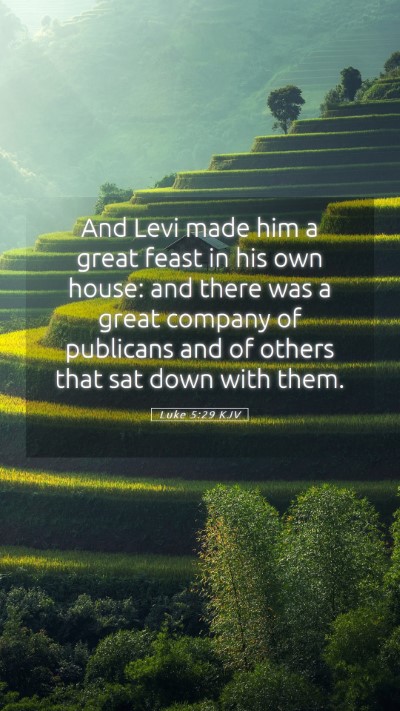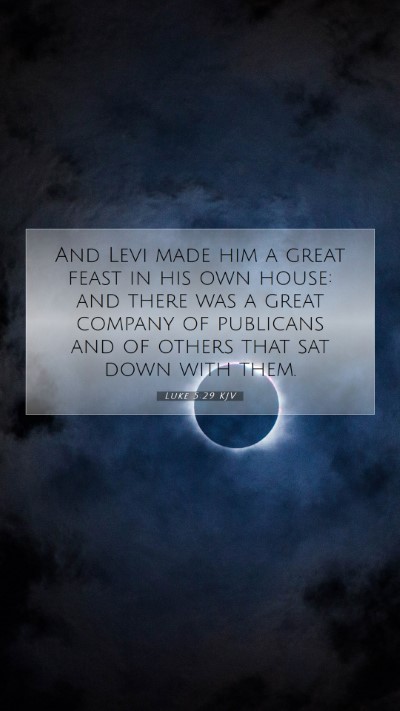Understanding Luke 5:29
In the Gospel of Luke, chapter 5, verse 29, the verse reads: "And Levi made him a great feast in his own house: and there was a great company of publicans and of others that sat down with them."
Bible Verse Meaning
This verse showcases a significant moment in the ministry of Jesus, emphasizing his approach towards sinners and outcasts. It highlights the transformation of Levi (Matthew), who, after being called by Jesus, decides to host a banquet in honor of his new identity as a follower of Christ.
Bible Verse Interpretation
- Levi's Transformation: Matthew Henry notes the change in Levi's life from being a tax collector to being a disciple of Jesus. This signifies the transformative power of Christ.
- Symbolism of the Feast: Adam Clarke interprets the feast as a way to symbolize community and fellowship among those of different social standings.
- Jesus and the Outcasts: Albert Barnes emphasizes Jesus' willingness to associate with publicans (tax collectors) and sinners, reflecting his mission to save the lost.
Bible Verse Understanding
Understanding Luke 5:29 involves recognizing the cultural context of the time. Tax collectors were often viewed with disdain by society, viewed as traitors for collaborating with the Romans. By dining with them, Jesus demonstrated that his message was for all, regardless of their past.
Scripture Analysis
By analyzing this scripture, we see it as part of the larger narrative concerning Jesus’ ministry. The act of dining with Levi and his friends can be seen as an act of inclusion, setting the stage for future invitations to a relationship with God.
Biblical Exegesis
Engaging in biblical exegesis reveals that this verse serves multiple purposes: it marks Levi's call, indicates Jesus' method of outreach, and further paints a picture of the values of the Kingdom of God, where love and acceptance transcend societal boundaries.
Bible Study Insights
This account challenges readers to consider their own judgments regarding whom they associate with and to reflect on the inclusive nature of Jesus' ministry. It encourages believers to reach out to those who might otherwise be marginalized.
Cross References
- Mark 2:14: The call of Levi (Matthew) as a disciple.
- Luke 15:1-2: Jesus' association with tax collectors and sinners.
- Matthew 9:10-13: Jesus eating with tax collectors and the state of the righteous.
Applying Luke 5:29 to Daily Life
This verse guides believers on how to interact with others, especially those who society may overlook. It prompts questions about how one practices inclusivity and compassion in everyday life.
Conclusion
In summary, Luke 5:29 serves as an important reminder of the heart of Jesus’ ministry – the call to embrace and accept others, regardless of their past. The invitation extended by Christ to Levi reverberates through time, challenging every believer to engage with the world through love and acceptance.


